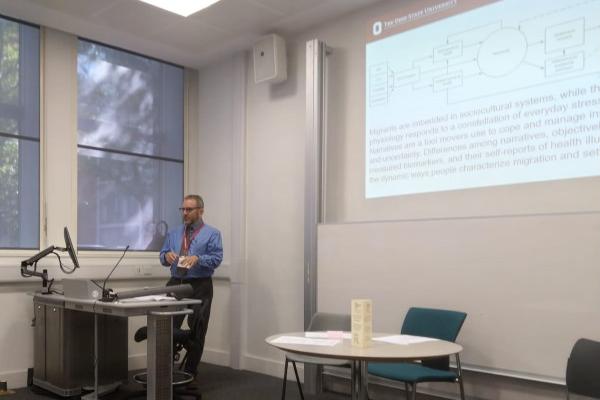Jeffrey Cohen co-chairs panel at the Royal Geographic Society

On August 29, Dr. Jeffrey Cohen co-chaired a panel at the Royal Geographic Society annual conference in London, England. Dr. Cohen’s panel “Prospects in Migration Theory: What is Next?” created a dialogue between various models of migration theory, attempting to address the problem of contradictory models that result in a gap of understanding human mobility.
This session included research from additional Ohio State Anthropology members. First, Dr. Cohen’s student and presidential scholar Natalia Zotova presented, “Aspirations, Adaptations, and Wellbeing: Central Asian and Mexican Migrants in the U.S” (Cohen is a co-author). Additionally, Dr. Cohen, Dr. Douglas Crews, and doctoral student Alexandra Tuggle presented “A Bioethnographic Approach to Migration: Outcomes in Mexican Sending and Destination Communities.”
The abstracts for both papers are below:
Aspirations, Adaptations and Wellbeing: Central Asian and Mexican Migrants in the US
Natalia Zotova (Ohio State University, USA)
Jeffrey H. Cohen (Ohio State University, USA)
A migrant’s travels are motivated by aspirations, desires, opportunities and insecurities. Working with Central Asian and Mexican migrants settled in the US, our paper defines the costs and benefits of migration and adaptation to a new environment. Not surprisingly, Central Asian and Mexican immigrants travel to the US for different reasons and face different challenges once settled. Nevertheless, for both groups of immigrants, aspirations – or their hopes for the future for themselves as well as their children – serve critical roles and are essential as migrants settle and seek opportunities while migrants-to-be to plan their travels and organize their resources. Reflecting on the theme of the conference, we find that for both groups, emerging "geographies of hope" drive mobility and are critical to success in newly founded destination communities. Our introduction briefly locates contemporary Central Asian and Mexican migration to the US. In the second part of our paper, we draw from ethnographic and biological data to identify how Central Asian and Mexican migrants use the stories they tell to adapt and manage wellbeing and the challenges of settlement. We note that both groups celebrate living in the US; nevertheless, Mexicans face elevated stress and increasingly negative health outcomes that are typically not present among Central Asians. In our conclusion, we argue that a focus on aspirations and the motivations driving migrants can be a useful framework for understanding the relationship between biology and culture, the socio-economics realities that challenge movers and the health implications of mobility as migrants plan for their futures.
A Bioethnographic Approach to Migration: Outcomes in Mexican Sending and Destination Communities
Jeffrey H. Cohen (Ohio State University, USA)
Douglas E. Crews (Ohio State University, USA)
Alexandra C Tuggle (Ohio State University, USA)
Migration for rural Oaxacans traveling from their home communities in southern Mexico to the border, the US and elsewhere is a disruptive and often dangerous process that includes family separations, discrimination and marginalization. The dangers associated with decision making around migration affect the health, wellbeing, aspirations and outcomes for both movers and non-movers and at points of origin and destination. While the complexity of migration challenges the health, wellbeing and more of the people involved, our understanding of the drivers associated with migration often are incomplete and based largely upon the narratives and demographic data we collect through ethnographic and survey based research. Our paper, summarizes our bioethnographic approach that seeks to untangle the complex web that surrounds migration and understand how culture and biology affect migration in ways that are only sometimes synchronized. A bioethnographic approach is founded in research with migrants and non-migrants (in this case movers and non-movers from Oaxaca, Mexico) at points of origin and destination. We combine their narratives, physiological data and self-reports of wellbeing to capture the complexity of mobility and explain the intricacies that confront Mexican migrants. We find that the narratives that our informants share, the biomarkers we collect and the self-reports of well-being are sometimes in parallel, but often they are not significantly associated and importantly, the narratives and self-reports shared by our informants can fail to capture the physiological stresses that individuals and their families face. We offer our bioethnographic approach as a way to understand and unpack the complex challenges that movers and non-movers face—and to better anticipate how to respond to migration’s outcomes in sending and destination communities and in the process rethink and reframe Mexican migration.
